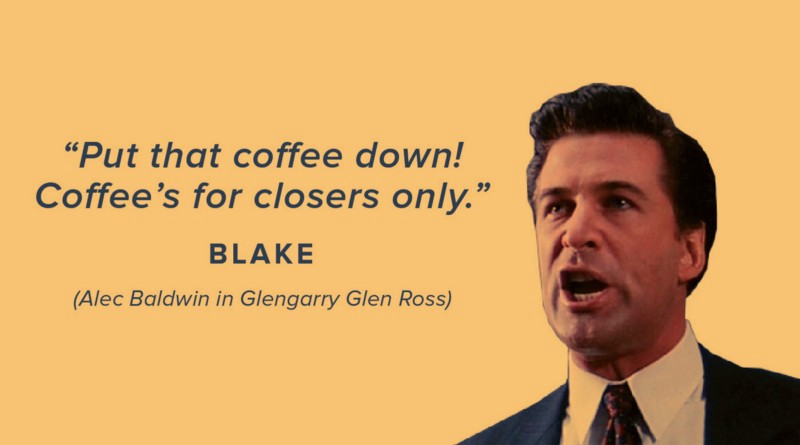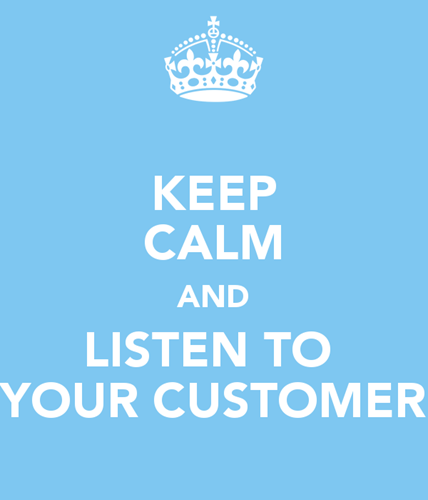Listening is a vital skill in sales, but it’s often the one that gets rushed, half-assed or done improperly. Even really talented salespeople sometimes catch themselves talking about the product before properly understanding what the potential customer is looking for.
If you don’t take the time to understand and educate, how can you possibly hope to solve a problem… and problem solving is what sales is all about, right?
Coffee is not just for closers; it’s for listeners
In the famous sales film Glengarry Glen Ross, there’s a widely-known and repeated scene where Alec Baldwin’s character Blake walks in and tells the salespeople in the dealership to “Put that coffee down. Coffee is for closers, only”.
He goes on to berate them and tell them how much they suck for not closing more and for wasting leads. Instead, perhaps he should have had a conversation about the importance of listening to customer needs and providing unique solutions to customer pain points, because that is what sales is really all about.

Perhaps the most important and most underused skill in sales is listening. Every sales person knows that they should listen more, but it’s so hard to do when you’re showing a product to a potential customer. You just want to tell them all about it… the amazing features and benefits and what differentiates you from the competition and how much your current customers love it and how you just KNOW it’s a perfect fit for them, too.
It’s really hard to listen more and show less, because… what if that lead doesn’t come back? I’ll admit that I struggle with this every single time I demo, especially when the meeting starts late and the prospect is in a rush to their next meeting.
I’m a nice guy and I really do want to help people solve problems in the most efficient possible manner, but sometimes the demo starts and all I do is show and talk. I’ve never won a deal that way, by talking about our product before understanding the customer, even when they seemed like a sure-fit and every time the conversation ends I already know that I opened my mouth too much. But it’s not just me, it’s a common problem for lots of sales and marketing people.
The truth is that if salespeople learn to be better educators and less “sales” people, they’ll do much better and have much happier customers. They should also view themselves as effective relationship builders and problem solvers. Because at the end of the day, that’s who people want to buy from… someone who understands them, has their interest at heart, and knows how to educate them on the values and uses of a product, rather than just selling, up-selling and cross-selling them at every opportunity.
The purpose of first-time sales is to solve another person’s problem with a highly inventive solution or new way of doing things. In order to do this, salespeople need to understand their prospects. And in order to that, of course, they first need to LISTEN to them.

Here are 5 quick tips to become a better listener:
1. Stop reading the sales books
Sure, some sales books are packed with pretty good insight… but the majority will just turn you into a sales robot by repeating and regurgitating the same stuff as every other salesperson who reads them. Instead, maybe read up on the most pressing needs of your target industries so that you have a deeper understanding of the problems they face.
2. Get rid of the cheat sheet
Every sales has one of these flow-charts, playbooks or “problem solving formulas” that basically says “when a customer experiences X, you say Y. Or when a customer says his pain point is A, you demo with B. Now, while I’m sure your sales managers or marketing team put a lot of time into those playbooks, what they really do is re-enforce the sales robot concept… meaning that you are not really listening to the customer, you’re just listening for keywords so that you know which play to call.
3. Slow down
Most of the time, when I fail to listen well, it’s because I am already pressed for time or have my own agenda. So, now anytime I find myself in that situation, I slow down, breathe, relax my muscles, slow my heart rate and remind myself that the person on the other end of the line has a problem and they have come to us in an attempt to solve it.
I think about what that other person is struggling with, I remind myself that they also have a task-list a mile long, a family to get home to and other things to do… and that this happens to be their biggest obstacle and priority at the moment, so it’s essential that I slow down, listen, pay attention and not just run through a demo.
I know for darn sure that whenever I have a problem and someone is just trying to sell me and not listen, they will never hear from me again. I don’t want to be that person. I want to understand and provide the best possible solution.
4. Practice active listening
Really listen to what the prospect is asking for, and then repeat your understanding of their needs or pain points. By doing this, you can be sure that there us clarity of understanding. This is not a tip for just sales either, it’s important in every aspect of daily life whether it be friends, family, colleagues or complete strangers.
Talk to more people, even if they’re not customers, just hold open conversations to learn about their daily struggles. Show some compassion and learn to view things from another human’s perspective. It is an invaluable skill to have.
5. Be bold enough to say no
If you have listened and your product is not the right fit for the customer, say so. Don’t drag them around, waste time, and try to sell them on side-benefits that your product only does moderately well.
Several times we’ve had leads who were looking for something our product does, but is not our core feature or focus, when we dug into their need, that feature is specifically what they were looking for. So, we passed them along to another business or in some instances offered a list of the top 3–5 companies who offered a product they wanted within their given price range. Sure, it cost us some time, but I’ve walked away from those deals more proud than the ones where I talked too much and didn’t listen.













